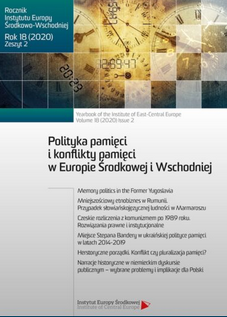The greatest catastrophe of (post-)colonial Central Europe? The 100th years anniversary of Trianon and official politics of memory in Hungary
The greatest catastrophe of (post-)colonial Central Europe? The 100th years anniversary of Trianon and official politics of memory in Hungary
Author(s): Gábor EgrySubject(s): Political history, Historical revisionism, Politics of History/Memory
Published by: Instytut Europy Środkowej
Keywords: Trianon; Hungary; Central Europe; politics of memory; post-colonialism;
Summary/Abstract: The Treaty of Trianon (hereinafter Trianon), the enormous losses of territory and co-ethnics, and the shaking of Hungary’s status as a dominant power in the Carpathian Basin imputed a tragic understanding of contemporary Hungarian history on the Hungarian society, invoking the idea of a trauma lasting even today. Trianon’s understanding became a divisive issue for political parties after 1989, highlighting the ever-deeper divisions between right and left-liberals, since 2010. Its “overcoming” is a flagship project of the government’s politics of identity, with modest success so far. Thus, the 100th anniversary was a crucial moment as a test case for a self-professed nationalist, traditionalist, conservative political force for manifesting a comprehensive politics of memory. In the light of the newly built monument at the heart of Budapest, with the Hungarian names of all localities on the territory of pre-1918 Hungary inscribed on its wall, a cautious shifting back to territorial revisionism was expected. In this article, I will argue that even with such tendencies being, obviously, present, the official commemorations were crafted with a surprising message, that attempts to turn the canonical understanding of Trianon upside down and reframe it into a common catastrophe of Central Europe. Doing so places the consequences in the context of the decolonization of history, the present decline of empires, and the emergence of nation-states while combining it with important tropes of the traditional, anti-liberal and revisionist Trianon discourse. Nevertheless, the result is a transparently political message that is not only driven by easily visible actual political goals (V4 and Central European cooperation), but one that detaches the politics of memory from historical references and legacies and creates a set of shallow symbols for utter instrumentalization, to recombine at will, in a vulgarised sense of post-modernism.
Journal: Rocznik Instytutu Europy Środkowo-Wschodniej
- Issue Year: 18/2020
- Issue No: 2
- Page Range: 123-142
- Page Count: 20
- Language: English

